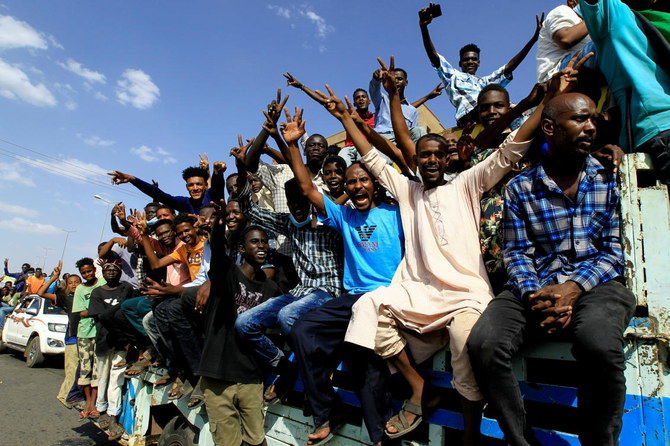The United Nations’ top human rights official on Friday condemned actions by military leaders in Sudan following a coup almost two weeks ago and called on them to “step back” to let civilian rule return.
UN High Commissioner for Human Rights Michelle Bachelet decried excessive use of force by security forces that has left at least 13 people dead and more than 300 injured since the coup. She also expressed concern about “numerous” arrests and disappearances of civil society and protest leaders, journalists, and activists.
Bachelet spoke during an urgent Human Rights Council session on Sudan. Britain, the United States, Germany and Norway led a push to commission an expert to monitor the situation in the African country.
The Human Rights Council debate took place while the UN still recognizes the ambassador from the deposed Sudanese government as the country’s official representative in Geneva. No representative from among Sudan’s top generals seemed to be attending the session.
“Events since the coup have recalled a somber page in the country’s history when freedom of expression was stifled and human rights were comprehensively repressed,” said Bachelet, in reference to the 30-year rule of Sudan by former autocrat Omar Al-Bashir.
“I urge Sudan’s military leaders, and their backers, to step back in order to allow the country to return to the path of progress toward institutional and legal reforms,” she added.
The Oct. 25 coup came more than two years after a popular uprising forced the military’s removal of Al-Bashir and his Islamist government in April 2019. It has upended the country’s fragile planned transition to democratic rule. Tens of thousands have taken to the street to protest since the takeover.
Massive anti-coup protests were in several instances met with excessive use of force, including use of live ammunition, as documented by the Joint UN Human Rights Office in Sudan, particularly in the capital, Khartoum, and the city of Omdurman.
According to medical sources, at least 13 civilians have been killed by military and security forces since Oct. 25, and more than 300 have been injured.
Sudan’s top general, Gen. Abdel-Fattah Burhan, and the forces loyal to him who dissolved Sudan’s transitional government and detained other government officials and political leaders, face increasing international pressure. Western nations have condemned the coup.
“Fundamentally, this is about respect for democracy and human rights,” Simon Manley, Britain’s ambassador in Geneva, said in a statement sent to The Associated Press. “I hope that fellow council members will stand in solidarity with the brave people of Sudan today.”
A draft resolution by the four Western countries presented earlier this week was considerably revised Friday. While the draft would have created a new, one-year post of a “special rapporteur” to monitor the situation, the final text asks Bachelet to appoint an expert to monitor the situation — until civilian rule is restored. The expert would work with her regional office in Khartoum and report back.
The resolution passed in the 47-member body without a vote.
The final text also jettisoned a call for immediate return to a civilian-led transitional government under Prime Minister Abdalla Hamdok, who was among those detained in the coup. Instead, it urges a “restoration of the civilian-led transitional government” without naming Hamdok, who is under house arrest but has been allowed to meet with UN and international diplomats as part of mediation efforts.
Many countries spoke out against the coup. But Russia and China, which often voice concerns about alleged international meddling in countries’ domestic affairs, took a different position. Chinese diplomat Li Song called for “constructive dialogue and cooperation” and cautioned that “external pressure will only complicate the situation.”
Russian representative Artur Chernyakov expressed Moscow’s opposition to the special session arranged mostly by the Western countries, calling it “a hasty decision. “
“Any interference in the internal affairs of that state is counterproductive and unacceptable,” Chernyakov said.
Inside Sudan, reports continue to emerge of new arrests of opposition figures.
The UN mission tasked with assisting Sudan’s transition to democracy on Friday condemned the arrest of three leaders from the Forces for Freedom and Change, a coalition that was born out of the 2019 protest movement.
In a statement, the mission said Taha Osman Isahaq, Sharif Mohamed Osman and Hamza Farouk were arrested near the mission’s headquarters in Khartoum on Thursday.
It said the new detentions were a step backward after reports that some officials held earlier would be released.
Sudan’s state-run news agency reported Thursday that Burhan had ordered the release of four government ministers who also were detained. A defense lawyer for the ministers said they had not yet been freed.

